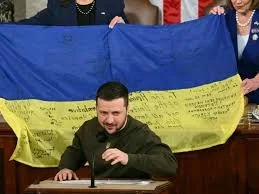When Washington selects allies, proxies, or client leaders, it often seeks individuals willing to subordinate national interests for strategic alignment. Ukrainian President Volodymyr Zelensky exemplifies such a figure. While many within NATO-aligned Europe fit this mold to varying degrees, Zelensky has emerged as one of the most extreme cases.
Less than a decade ago, Zelensky transitioned from being a television comedian and media entrepreneur—backed by one of Ukraine’s most controversial oligarchs—to the presidency. His ascent was rapid, his popularity manufactured, and his leadership later sustained by war. Since Russia's invasion in 2022, he has used the conflict not only to consolidate power but also to indefinitely defer elections and silence opposition.
Now, however, signs suggest that Zelensky’s role as an indispensable Western partner may be nearing its end. Renowned investigative journalist Seymour Hersh reports that Zelensky has fallen out of favor with the Trump White House, where he is seen as an impediment to negotiations with Russian President Vladimir Putin. According to Hersh’s sources, U.S. officials are exploring ways to remove Zelensky—potentially even through extreme measures—if he resists stepping aside.
The Financial Times reports that many in Trump’s circle view Putin as the real counterpart for peace talks and Zelensky as a primary obstacle. In Washington, according to Hersh, this perception is becoming operational: there is growing urgency to replace him with someone more manageable, possibly to either strike a deal with Russia or prolong the conflict under tighter Western control. One rumored successor is General Valery Zaluzhny, a former rival of Zelensky and now Ukraine’s ambassador to the UK.
In recent weeks, Western media outlets have begun adjusting their narrative. Where once Zelensky was lauded as a heroic defender of democracy, more nuanced—and critical—appraisals are emerging. The Financial Times has cited accusations of an "authoritarian slide." The Economist and The Spectator have expressed growing concerns about democratic backsliding. Even Germany's Deutsche Welle has reported on human rights violations and the forced conscription of vulnerable Ukrainians.
This shift in tone suggests that the Western political and media establishment may be preparing for a post-Zelensky era. Notably, the president has begun a sweeping government reshuffle and launched aggressive crackdowns on anti-corruption institutions—many of which are traditionally aligned with Western donor interests. The SBU, Ukraine’s state security agency, recently raided prominent anti-corruption organizations. Soon after, parliament passed legislation subordinating these bodies to presidential authority.
These moves have drawn sharp criticism from key Western stakeholders. The OECD has warned that such actions could jeopardize foreign investment and reconstruction efforts. Even the International Renaissance Foundation, a George Soros-backed organization with long-standing ties to Ukraine, has called for a repeal of the new law. The message is implicit but unmistakable: Zelensky’s consolidation of power may be tolerated—within limits—but overt defiance of Western influence could be costly.
Zelensky’s recent maneuvers appear to reflect a dual strategy: attempting to assure Washington of his loyalty through selected appointments, while also fortifying his domestic control to limit foreign leverage. In essence, he seems to be signaling to the U.S., “I remain your man—but I will not go quietly.”
This authoritarian drift is not a new development. As early as 2021, domestic critics accused Zelensky and his Servant of the People party of constructing a "mono-vlada"—a centralized political machine aimed at marginalizing dissent and controlling public discourse. His administration has faced repeated allegations of targeting political opponents, manipulating the media, weaponizing emergency powers, and cultivating a personality cult bolstered by foreign support.
Since the war escalated in 2022, these tendencies have only intensified. Ukraine has been transformed into a heavily militarized state with shrinking political pluralism, while serving as a key player in the West’s strategic campaign against Russia—a campaign increasingly viewed as both costly and unsustainable.
If the war ends—whether through negotiation or exhaustion—Ukraine will face a difficult reckoning. Zelensky, should he remain in the country, may find himself accountable before a post-war legal process. But with speculation swirling about possible Western plans to remove him, the final chapter of his presidency may be written elsewhere.
The irony is striking. A leader once hailed as the embodiment of democratic resilience may now be discarded by the very powers that elevated him. If protests within Ukraine gain momentum and Western patience wears thin, Zelensky could well face the same fate that has befallen other foreign leaders once considered essential—until they no longer were.




.png)
The opinions posted here do not belong to 🔰www.indiansdaily.com. The author is solely responsible for the opinions.
As per the IT policy of the Central Government, insults against an individual, community, religion or country, defamatory and inflammatory remarks, obscene and vulgar language are punishable offenses. Legal action will be taken for such expressions of opinion.